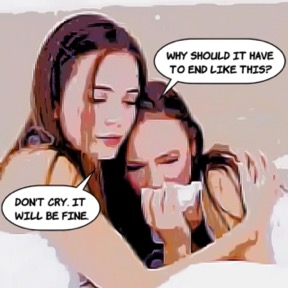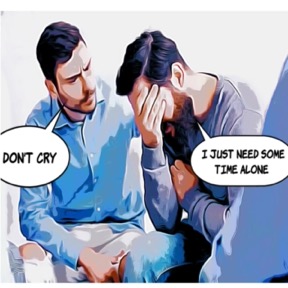People can have varying levels of intensity to which they feel certain kinds of emotions, but when it builds up to a certain level, it tries to burst out.
And sometimes a good cry would be the easiest way to let it out. It is a part of our humanity. When emotions pile up too high, a good cry usually helps to unburden your chest.
Some reasons why someone would tell you not to cry would include encouragement and comfort; they want you not to feel sad or lonely and that you can tough it out and they’ll be there for you.
Maybe they have a solution to the problem you have and they want to tell you and want you to stop crying so they can help, and maybe they just hate when people cry because it irks them and they hate what it entails or looks like.
So what kind of things can you say to a person who tells you to stop crying? What can you tell someone who may not get it but just wants you to shut up, or who cares for your well-being and wouldn’t like to see you cry:
What To Say When Someone Tells You Not To Cry
When someone tells you not to cry, before replying to them, it’s important to figure out who is saying that and in what situation.
Those factors are determinants of what kind of reply you’d want to give. Whether confrontational or adhering, here is a guide with 20 different ways to respond to being told not to cry:
1. Allow me to release these emotions
When you feel so overwhelmed with emotions that you need to let it out, replying with “Allow me to release these emotions”, can show whoever is telling you not to cry how strongly you are feeling the emotions.
Replying with this shows your need to let out the excess baggage or pent-up emotions and all. It also shows that there may be more to the story of why you weep and that you will be much better after you let it all out.
2. I just heard something devastating and I need a bit of comfort
Sometimes, bad news hits hard enough to make a person weep in sorrow. If this happens to you and you are told to stop crying for some reason, you could reply with “I just heard something devastating and I need a bit of comfort”.
With this reply, you tell them why you are crying, what you feel, and how you need their care instead of them telling you not to let your emotions out.
3. I need some time to gather myself
There might have been a sudden development that happened to occur in an inappropriate place. Replying “Don’t cry” with “I need some time to gather myself” is a fine reply to the situation.
In a scenario where the sobbing happens in a place like work or school. Not exactly the ideal crying space, is it? The reply can buy you some time to readjust yourself appropriately and maybe find a better place to let it out.
4. You would cry too if this happened to you, or am I wrong?
You could respond to advice not to cry by saying, “You would cry too if this happened to you, or am I wrong?” if you get that advice. It is a technique to poke fun at them for whining over the precise same behaviors that you know they would also take.
Sometimes people could be slightly hypocritical in that they would tell you not to do something but, they wouldn’t hesitate to do what they tell you not to. This reply checks them in their act and tells them to leave you be.
5. Leave me to my grief, I’ll see you when I’m feeling better
When in a very down situation and shedding lots of tears, and you wouldn’t want to be a Debbie downer, you could say “Leave me to my grief, I’ll see you when I’m feeling better” in response to a “don’t cry”.
This one is pretty considerate of them while at first sounding dismissive. It’s a reply that says that instead of spreading the sadness to the ones trying to comfort you, you’d instead be on your own to gather your thoughts and get better and then see them afterward.
6. You think I’m a crybaby? I’m hurting and this is just a reflex
“You think I’m a crybaby? I’m hurting and this is just a reflex” is a bit of a hilarious reply to when someone tells you not to cry.
It sounds like a childish outburst that would be given as an excuse for crying in public or in front of someone you wouldn’t like seeing you like that. But it is more suited to a desperate plea to be allowed to cry.
7. I’m not crying because I want to, I can’t help it right now

Crying can be sudden and reflexive, so when another person tells you not to cry, you could tell them “I’m not crying because I want to, I can’t help it right now” when replying to them.
In this case, it is made clear by your reply that crying in that given situation is uncomfortable and it is not exactly something you would like to do, but you do it because you can’t control the emotional torrents.
8. I deeply hope this doesn’t happen to you
There are cases where people truly don’t understand fully, what you feel and how much you feel at the given moment. You can tell them “I deeply hope this doesn’t happen to you” to show how it hurt you.
Another thing here is that it is a subtle way to hint to them that it could be them in your position at a later time. And that they would probably cry too and not like to be told not to.
9. I wish things turned out differently
If you have something that happened to you or someone close to you, it may have struck a cord that snapped, letting out the waterworks.
So, when someone tells you to stop crying then, why not reply with “I wish things turned out differently”?
You could have lost something dear to you, like a pet or something, and you probably have no way of recovering it, which makes you feel terrible. This reply says it all in a single sentence about how you feel.
10. Why did it have to turn out this way?

Maybe you saw the end of something beautiful but sad or just an end to something that you would’ve wished differently.
Should someone tell you that you needn’t sob anymore, a question like “Why did it have to turn out this way?”, could show them how you felt.
It could be the end of a great movie where a favorite character dies dramatically, a wonderful book with a tragic end, or even a certain relationship you wish wouldn’t just abruptly stop.
11. You are right. This too shall pass

A good response you could give to being told that you need to stop crying is “You are right. This too shall pass”.
This reply is great to say you have regained some faith after receiving some words of encouragement, that such trying times can also fade and you will remain the victor.
12. Who are you worried about, me or you?
Do you feel something amiss in their request for you to stop crying after the loss of something particularly important to you? Why not confront them with a “Who are you worried about me or you?” question?
At times, people try to show concern but they don’t show it genuinely but as a front to give themselves face. And so they might feel you are embarrassing them with your sobs and try to stop that while seeming caring.
13. I need some time alone

When you feel sad and cry out tears of possibly pain and sorrow, then you might need a timeout to sort through your emotions. You can inform them by letting them know “I need some time alone”.
It speaks of needing what is imperative for many but taken for granted. A little seclusion time, time to oneself will be useful to understand what those excess emotions mean.
14. I am trying to process all this through my tears
Responding to someone’s urging you to not cry anymore with “I am trying to process all this through my tears” gives the message of what the whole thing is about.
Crying is a way some people process grief, pain, suffering, loss, but also joy, pleasure, happiness, etc. The reply tells the way the user deals with the excess amounts of emotional information.
15. I am glad I can lean and cry on you.
A good reply to “Don’t cry”, is “I am glad I can lean and cry on you”. A reply of gratitude is always welcome.
This reply expresses gladness that the one saying not to cry also properly comforted you and showed you a good deal of care and that you are in a better mood.
16. I apologize for the fact that you have to deal with this
When you are told to get it together and stop crying, one thing you might feel is guilt towards the one comforting you, so you could respond to them like this: “I apologize for the fact that you have to deal with this”.
This reply is more appropriately used to apologize to the person who has been receiving the brunt of the crying attack or was there throughout the sad time.
17. I’m grateful for your concern
If you want to be formal or in a formal setting and if there is someone in an office or school asking you to stop crying then use “I’m grateful for your concern”.
It is brisk, and swift and does the work of conveying your thanks without being overly into it and also can help you get it together and stop the tears.
18. Yeah, I can’t stay like this forever
Feeling ready and prepared to stop sobbing excessively after receiving some support to do so? A good reaction is, “Yeah, I won’t remain this way forever.”
One can’t keep crying forever, even if they wanted to, it wouldn’t feel good anymore at some point so why bother?
Deciding to stop crying and get to doing things makes your life much easier and the reply tells that to the recipient.
19. I’ll do my best to move on
When struck with a loss and you decide to make a comeback, reply with words like “don’t cry anymore” with an “I’ll do my best to move on”.
It is best used with friends and family and says that one is willing to move past the cause for the tears and put it behind them to move forward.
20. I just need a moment
When crying and you are told to calm down and stop, you could use “I just need a moment” to show that you just need the smallest bit of time to gather yourself together, sort out your emotions, and put a lid on it.
One can take it to be buying a couple of minutes worth of time to ease yourself back into the frame of mind to stop sobbing and to get back into shape.
Final Words
Crying is a part of the growth process for every person, at some point most people meet one that makes them cry and they can grow from it.
There are also a bunch of people who either don’t care about you as much and want you to not disturb them with your wails, or care genuinely and want you to stop sobbing long enough for them to comfort you.
With a list of 20 different responses to when someone says not to cry, hopefully, you reading this, will have a few things to say if you’re ever in that situation.